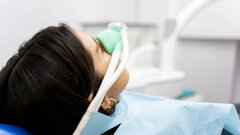LONDON, UK: Much of the legacy of the Romans is still evident in Britain today. New evidence from a study by King’s College London researchers on the skulls of ancient inhabitants of the island has given reason to believe that this might not have been the case for periodontal health.
While most of the skulls examined bear evidence of infections, dental decay or extensive tooth wear, typical for a coarse-grain and cereal-rich diet, periodontal disease was largely absent. Only 5 per cent showed signs of the disease, despite the widespread lack of dental care and routine oral hygiene in Roman Britain.
According to the researchers, the findings shed more light on the negative effects of modern lifestyle habits on oral health. They also support the importance of risk factors in determining susceptibility to periodontal disease in modern society, they said.
Currently, 15 to 30 per cent of Britons are estimated to suffer from some form of periodontal disease. The most severe kind, believed to be associated with systemic conditions, such as diabetes, and factors like smoking, affects one in 15 people in the UK, according to National Health Service figures.
The researchers suggested that the prevalence of periodontal disease was low among the Roman Britons investigated in the study because the population did not smoke extensively. Tobacco was only introduced in Britain in the sixteenth century when English traders first began to import the plant from the new colonies. In recent years, the habit has been on the decline owing to a ban on smoking in public places, among other things, which could indicate a future improvement in periodontal health, according to the researchers.
“As smoking declines in the population, we should see a decline in the prevalence of the disease,” co-author Prof. Theya Molleson from the Natural History Museum in London said.
For the study, published in the British Dental Journal, the researchers examined over 300 skulls excavated from a burial ground in Poundbury in Dorset. The remains, which are part of the museum’s palaeontological collection, are of people of different ages and from different social backgrounds.
LONDON, England: The UK government has launched a 12-week consultation proposing a ban on sales of high-caffeine energy drinks to under-16s. This ...
LONDON, England: The commercial baby food industry powerfully shapes early childhood nutrition in the UK and globally. Despite its trusted image, its ...
LONDON, UK: The British Dental Association has rejected the results of a new Which? study that indicate dentists are to blame for confusion about dental ...
LONDON, UK: In a new move by Public Health England (PHE), a campaign has been initiated to help parents take control of their children’s snacking. ...
NEWPORT, Wales: Organised by the British Orthodontic Society, the 2025 British Orthodontic Conference (BOC) promises to bring together the entire UK ...
BIRMINGHAM, England: The 2025 British Dental Conference & Dentistry Show (BDCDS) promises to be the most inspiring and influential edition yet. Taking ...
LONDON, UK: It is commonly believed that Britons are among those with the worst teeth in the world. However, new research has now shown that oral health in ...
LONDON, UK: A dentist from London has been ordered to pay more than £100,000 in compensation to the NHS within six months. If he fails to pay, he ...
KRIENS, Switzerland: A brush that cleans where others do not? An expert in prophylaxis and periodontics, Dr Ulrich P. Saxer is the co-designer of a brush ...
LONDON, UK/ROME, Italy: That the consumption of sweet, carbonated and alcoholic drinks—which are all main characteristics of Prosecco—lead to tooth ...
Live webinar
Tue. 24 February 2026
6:00 pm UTC (London)
Prof. Dr. Markus B. Hürzeler
Live webinar
Tue. 24 February 2026
8:00 pm UTC (London)
Prof. Dr. Marcel A. Wainwright DDS, PhD
Live webinar
Wed. 25 February 2026
4:00 pm UTC (London)
Prof. Dr. Daniel Edelhoff
Live webinar
Wed. 25 February 2026
6:00 pm UTC (London)
Live webinar
Thu. 26 February 2026
1:00 am UTC (London)
Live webinar
Tue. 3 March 2026
4:00 pm UTC (London)
Dr. Omar Lugo Cirujano Maxilofacial
Live webinar
Wed. 4 March 2026
1:00 am UTC (London)
Dr. Vasiliki Maseli DDS, MS, EdM



 Austria / Österreich
Austria / Österreich
 Bosnia and Herzegovina / Босна и Херцеговина
Bosnia and Herzegovina / Босна и Херцеговина
 Bulgaria / България
Bulgaria / България
 Croatia / Hrvatska
Croatia / Hrvatska
 Czech Republic & Slovakia / Česká republika & Slovensko
Czech Republic & Slovakia / Česká republika & Slovensko
 France / France
France / France
 Germany / Deutschland
Germany / Deutschland
 Greece / ΕΛΛΑΔΑ
Greece / ΕΛΛΑΔΑ
 Hungary / Hungary
Hungary / Hungary
 Italy / Italia
Italy / Italia
 Netherlands / Nederland
Netherlands / Nederland
 Nordic / Nordic
Nordic / Nordic
 Poland / Polska
Poland / Polska
 Portugal / Portugal
Portugal / Portugal
 Romania & Moldova / România & Moldova
Romania & Moldova / România & Moldova
 Slovenia / Slovenija
Slovenia / Slovenija
 Serbia & Montenegro / Србија и Црна Гора
Serbia & Montenegro / Србија и Црна Гора
 Spain / España
Spain / España
 Switzerland / Schweiz
Switzerland / Schweiz
 Turkey / Türkiye
Turkey / Türkiye
 UK & Ireland / UK & Ireland
UK & Ireland / UK & Ireland
 International / International
International / International
 Brazil / Brasil
Brazil / Brasil
 Canada / Canada
Canada / Canada
 Latin America / Latinoamérica
Latin America / Latinoamérica
 USA / USA
USA / USA
 China / 中国
China / 中国
 India / भारत गणराज्य
India / भारत गणराज्य
 Pakistan / Pākistān
Pakistan / Pākistān
 Vietnam / Việt Nam
Vietnam / Việt Nam
 ASEAN / ASEAN
ASEAN / ASEAN
 Israel / מְדִינַת יִשְׂרָאֵל
Israel / מְדִינַת יִשְׂרָאֵל
 Algeria, Morocco & Tunisia / الجزائر والمغرب وتونس
Algeria, Morocco & Tunisia / الجزائر والمغرب وتونس
 Middle East / Middle East
Middle East / Middle East


















































To post a reply please login or register